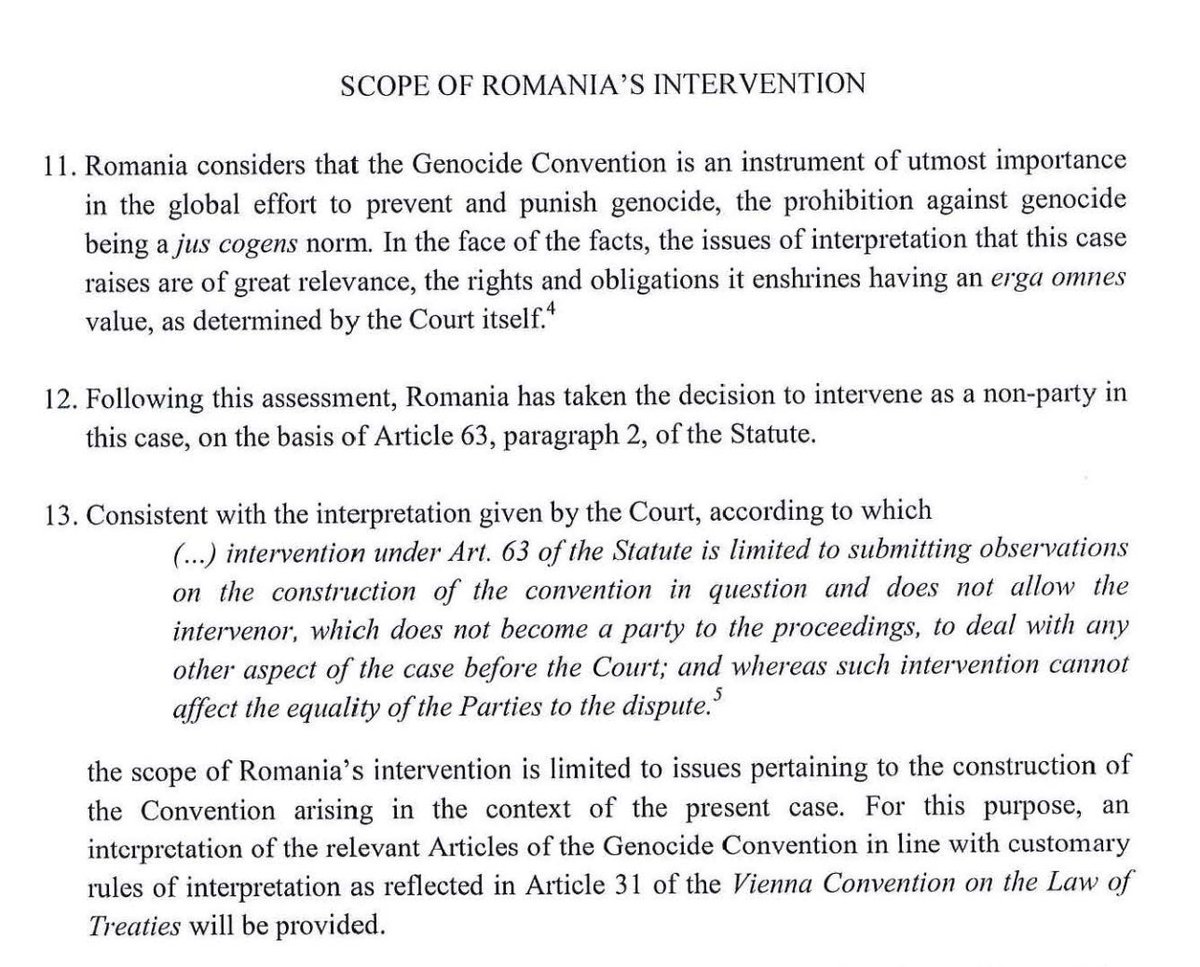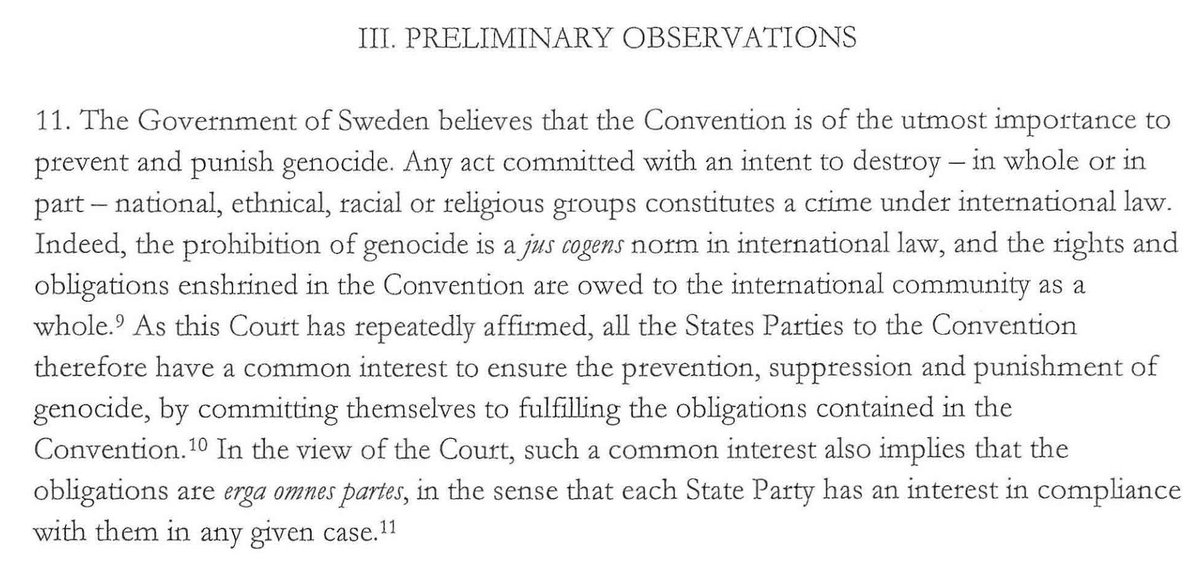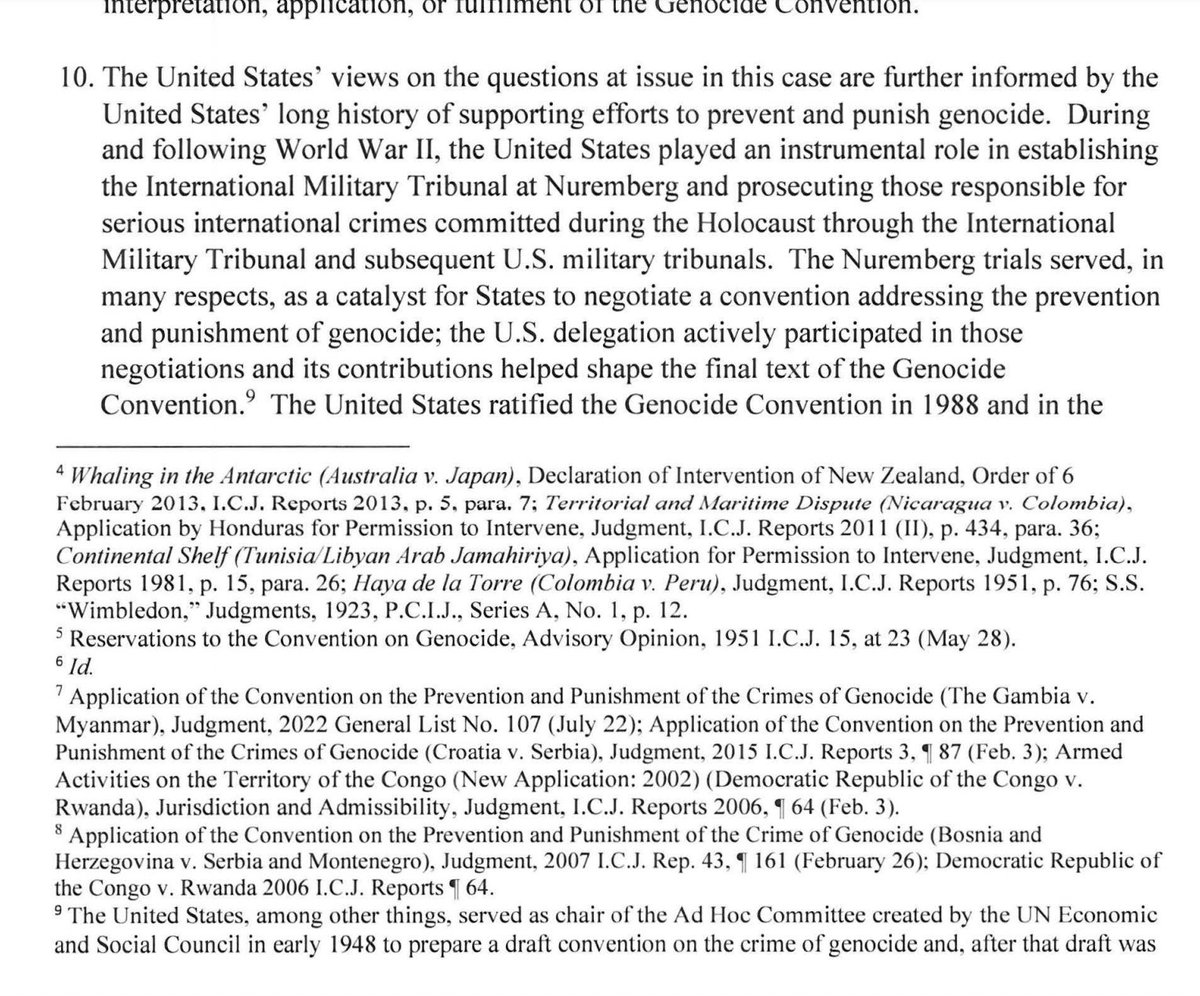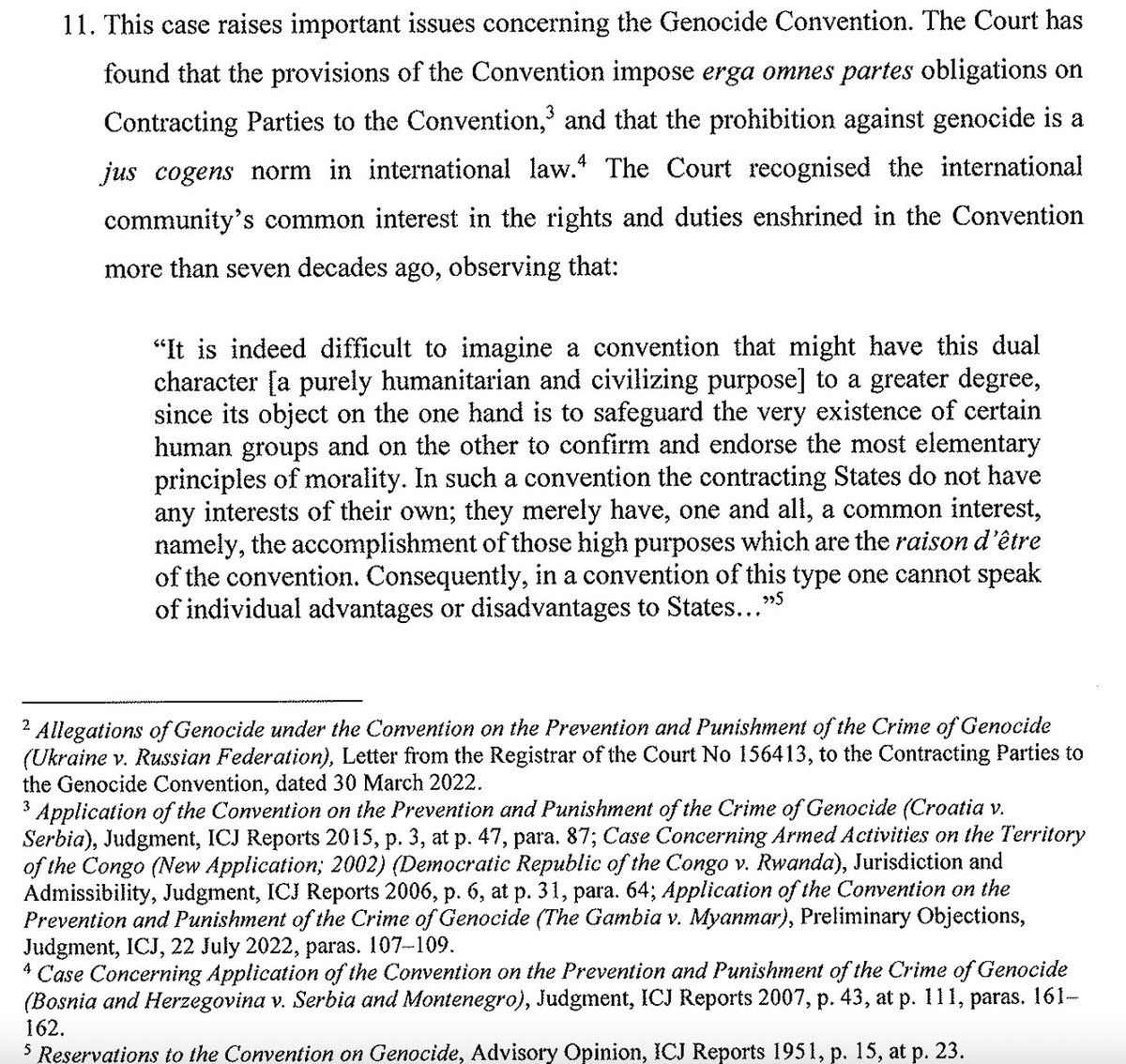
#Poland🇵🇱, #Italy🇮🇹 and #Denmark's🇩🇰 respective declarations of intervention are now available on the #ICJ's website:
icj-cij.org/public/files/c…
icj-cij.org/public/files/c…
icj-cij.org/public/files/c…
Some observations 🪡 #Ukraine #Russia 1/27
icj-cij.org/public/files/c…
icj-cij.org/public/files/c…
icj-cij.org/public/files/c…
Some observations 🪡 #Ukraine #Russia 1/27
https://twitter.com/CIJ_ICJ/status/1570809812962934788
To begin all three states invoke their "right" to intervene under art 63 of the Statute, while Denmark and Italy also invoke the nature of obligations in the Genocide Convention. All three also try to add their respective personal touches. 2/
🇵🇱 invokes its "history of supporting efforts to prevent and punish genocide", following "genocide perpetrated on Polish nationals during [WWII] by Nazi Germany and the Soviet Union (the predecessor of [Russia])", while noting Soviet perpetrators were never held to account. 3/ 

🇮🇹 cites its support for promoting the object & purpose of Convention, including in development of international criminal law and establishing international criminal tribunals.
🇩🇰 cites its support for ICJ's role under the Convention and importance of international cooperation.4/

🇩🇰 cites its support for ICJ's role under the Convention and importance of international cooperation.4/


All three add that art 63 intervention extends to jurisdictional issues; 🇮🇹🇵🇱 cite Judge Schwebel in Nicaragua, 🇩🇰 cites leading treatises.
Interestingly, both 🇵🇱🇩🇰 also cite the Rules, arguing that demand declarations be submitted ASAP underlines this possibility. 5/


Interestingly, both 🇵🇱🇩🇰 also cite the Rules, arguing that demand declarations be submitted ASAP underlines this possibility. 5/



🇵🇱🇩🇰 also offer to assist Court in "grouping its intervention together with similar interventions", if the ICJ deems it useful for the "expedient administration of justice". 6/ 



On another formality, 🇮🇹 singles out arts I, II, III, IX as provisions it seeks to construct, while 🇩🇰 adds to these art VIII. 🇮🇹 also points to art 53 of the ICJ Statute, which necessitates the Court satisfy it has jurisdiction, as underlying relevance of art IX. 7/ 

Interestingly, 🇵🇱 does not formally single out specific provisions at the beginning of its declaration, though the relevant provisions are apparent from the substance of its declaration. 8/
Before addressing provisions, 🇵🇱 makes some general observations, concluding that "[a]s the provisions of the Convention contain peremptory norms aimed at safeguarding human groups, they cannot be construed as a legal instrument justifying aggression against other States". 9/ 
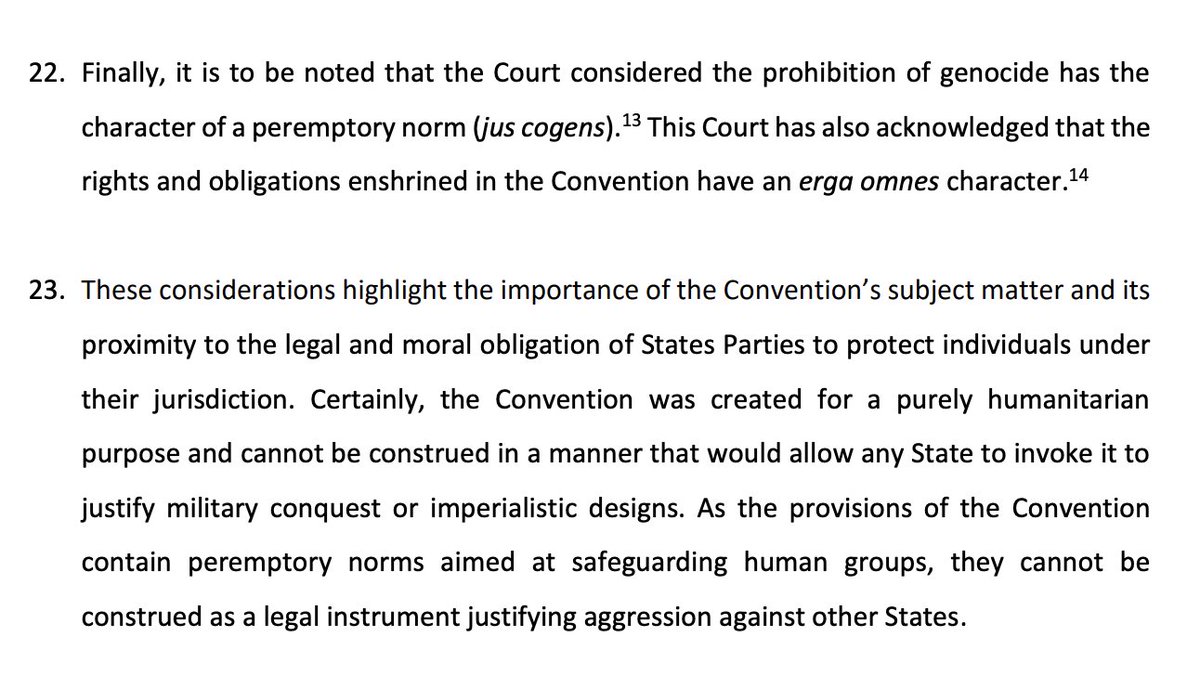
All three states address at length the interpretation of art IX, all reaching the conclusion that the Court's jurisdiction extends to non-violation claims and to issues of good faith application of Convention obligations. 10/
Many of the arguments in justifying jurisdiction for non-violation claims are familiar. They all refer to the long-standing jurisprudence on the definition of "dispute". 11/ 





They all also refer to the broad formulation of art IX, and particularly the "any party" and "fulfilment" formulae.
Otherwise, 🇵🇱🇩🇰 also rely on the ICJ's recent findings in the #Rohingya case that jurisdiction also extends to claims of non-action. 12/

Otherwise, 🇵🇱🇩🇰 also rely on the ICJ's recent findings in the #Rohingya case that jurisdiction also extends to claims of non-action. 12/


By way of example, 🇵🇱 makes remark similar to 🇸🇪 that if ICJ finds respondent hasn't committed genocide, "it may decline its jurisdiction". Yet, apart from being a merits issue, doesn't this undermine argument jurisdiction extends to finding claim of genocide unsubstantiated? 13/ 

For its part, 🇮🇹 refers to the US Nationals in Morocco as authority for the Court's ability to exercise jurisdiction over non-violations.
Interestingly, Italy considers this as relating to "interpretation". Surely, it is also (if not primarily) one of "application"? 14/

Interestingly, Italy considers this as relating to "interpretation". Surely, it is also (if not primarily) one of "application"? 14/


On issue of jurisdiction over good faith application, 🇵🇱🇩🇰 i.a. refer to the phrase "relating to" in art IX as signifying issues of good faith application of the Convention and "abuse of law" are covered by art IX. 15/ 



🇵🇱 also expands on teleological considerations which support its position that jurisdiction extends to issues of good faith application. 16/ 



🇵🇱 makes an even more audacious argument. Invoking the ICJ's position as the principal judicial UN organ, it refers to UN's purpose of maintaining peace and security and argues that the ICJ "has a positive obligation to contribute to that aim". 17/ 

Italy addresses the issue of jurisdiction over good faith application from a slightly different perspective. Italy primarily underlines obligation under international to interpret and apply treaty in good faith, while considering that all treaties prohibit abusive application.18/ 



In any event, 🇵🇱🇮🇹🇩🇰 all reach conclusion that jurisdiction also extends to disputes over recourses to force on the basis of the Convention. 19/
The three declarations are somewhat more brief on merits issues, and generally follow the same themes, particularly: underlying the need to act in due diligence in making determinations of genocide to be acting under the Convention framework; defining genocide narrowly;... 20/
...and emphasising the criminal law-nature of punishing genocide.
However, there are nuances between the different declarations and emphases on different aspects.
For example, 🇵🇱 briefly tries to place the definition of "genocide" in historical perspective. 21/

However, there are nuances between the different declarations and emphases on different aspects.
For example, 🇵🇱 briefly tries to place the definition of "genocide" in historical perspective. 21/


There are nuances in the states' approaches to prevention of genocide and otherwise unlawful acts. 🇵🇱, referring to 🇧🇦v🇷🇸, argues that only lawful measures may be adopted in preventing genocide. 🇮🇹 makes similar point, while also referring to 16 March order. 22/ 



🇩🇰 appears to consider there could be room for taking otherwise unlawful action in preventing genocide but emphasises that such acts cannot be core crimes or violations of IHL. Like 🇬🇧, 🇩🇰 also argues that ICJ does not need to consider legality of humanitarian intervention. 23/ 

Significantly, 🇵🇱🇩🇰 appear to (basically) argue that Russia's conduct amounts to a violation of the Convention. For 🇵🇱, "a duty to “prevent” genocide necessarily encompasses the duty not to create and disseminate false accusations of such a grave crime being committed". 24/ 

For 🇩🇰, acting to another state's detriment on the pretext of preventing genocide without a due diligence assessment "constitute[s] an abuse of the law and a violation of the Genocide Convention" 25/ 

In conclusion, while three separate declarations, Poland’s, Italy’s and Denmark’s are very similar in structure and substance – sometimes even using identical language.
Many of the points they make will sound very familiar. Yet, they also make some new ground. 26/
Many of the points they make will sound very familiar. Yet, they also make some new ground. 26/
Poland and Denmark also try to attempt probably the trickiest point of them all: arguing that Russia’s conduct is not only not authorised by the Convention but also a violation thereof. 27/27
• • •
Missing some Tweet in this thread? You can try to
force a refresh






